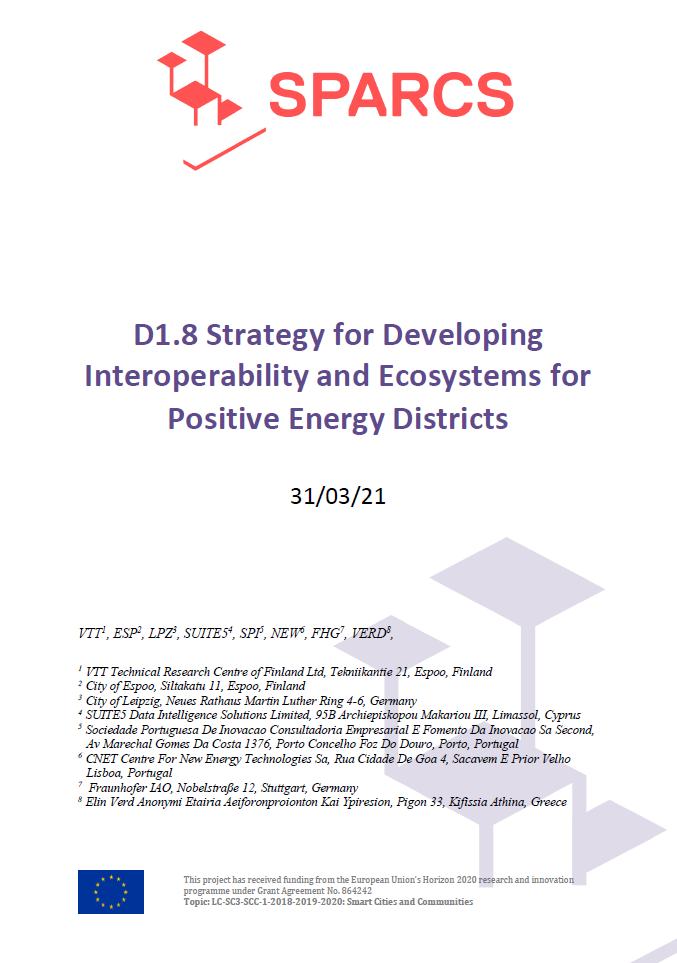D1.08 Strategy for Developing Interoperability and Ecosystems for Positive Energy Districts
The objective of the SPARCS project is to demonstrate and validate technically and socioeconomically viable and replicable, innovative solutions for rolling out smart, integrated positive energy systems for the transition to a citizen-centred zero carbon & resource-efficient economy. This will be done through development of systemic solutions, and strategic interventions in SPARCS lighthouse cities, Espoo and Leipzig.
To achieve PEDs, there is a need for both energy and digital transitions. This entails the combination of not only different energy sources and data but also data and information from distributed and at times,heterogeneous data sources and applications from multiple stakeholders. Only when this data and information is combined can meaningful analysis be done, efficient demand-supply management of energy ensured, and actionable intelligence provided to stakeholders to make informed decisions.
This deliverable makes an attempt to understand the different data and information needs of PEDs, the main ICT requirements, and to explore the different planned interventions in Espoo and Leipzig to support their urban transitions. It, furthermore, presents the SPARCS ICT ecosystem, interoperability mechanisms, infrastructure requirements, and the main mechanism for optimising and visualising urban energy flows. A positioning framework (reference architecture) is also presented that supports mapping and visualisation of the ICT elements of the planned interventions in Espoo and Leipzig. This is expected to provide others with a better understanding of how to implement similar interventions in their respective cities be Having an ICT solution alone is of course not enough. This deliverable also explores different PED implementation benefits for different stakeholders and presents the SPARCS approach to understanding and evaluating the replicability and scalability of solutions supporting the transition towards PEDs.
As SPARCS is still in a relatively early stage in terms of definition of the PED interventions in the Lighthouse Cities, the true impact potential of these interventions has not been validated. It is proposed that this deliverable be updated in month 40 of the project where more information on the impact of the developed tools and implemented interventions becomes available.
Authors
VTT1, ESP2, LPZ3, SUITE54,SPI5,NEW6, FHG7, VERD8
1VTT Technical Research Centre of Finland Ltd, Tekniikantie 21, Espoo, Finland
2City of Espoo, Siltakatu 11, Espoo, Finland
3City of Leipzig,Neues Rathaus Martin Luther Ring 4-6, Germany
4SUITE5 Data Intelligence Solutions Limited, 95B Archiepiskopou Makariou III, Limassol, Cyprus
5Sociedade Portuguesa De Inovacao Consultadoria Empresarial E Fomento Da Inovacao Sa Second, Av Marechal Gomes Da Costa 1376, Porto Concelho Foz Do Douro, Porto, Portugal
6CNET Centre For New Energy Technologies Sa, Rua Cidade De Goa 4, Sacavem E Prior Velho Lisboa, Portugal
7Fraunhofer IAO, Nobelstraße 12, Stuttgart, Germany
8Elin Verd Anonymi Etairia Aeiforonproionton Kai Ypiresion, Pigon 33, Kifissia Athina, Greece

